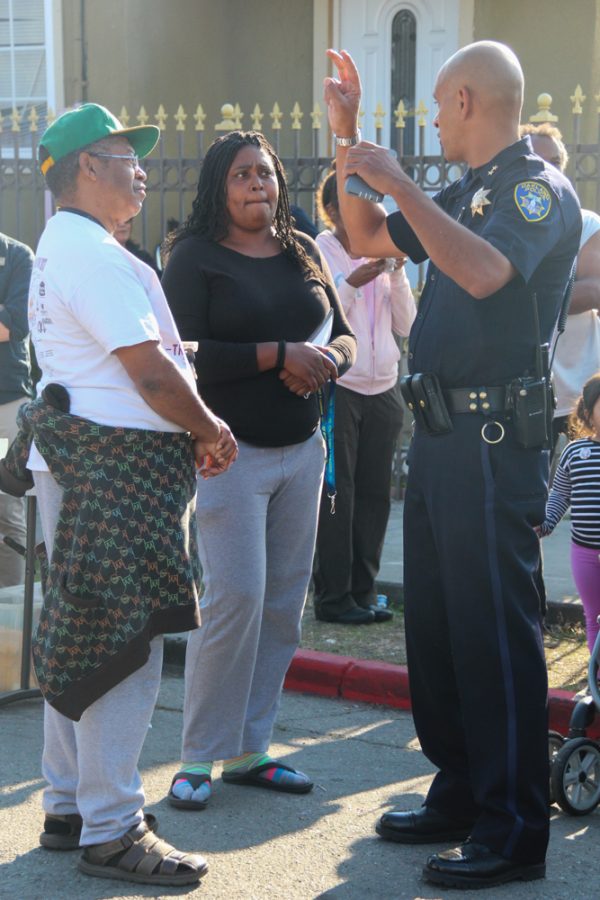Oakland: Council sends police oversight commission measure to voters
July 27, 2016
A controversial measure to establish a civilian police commission is headed to the November ballot after a flurry of last-minute changes and objections from reformers over who gets to pick the members.
The Oakland City Council’s unanimous vote Tuesday came with a sense of urgency as it was their final meeting before the Aug. 12 deadline to place the measure on the fall ballot.
Recent police scandals, including sexual misconduct involving several officers and the teenage daughter of a police dispatcher, and racist text message exchanges, have renewed calls for a more powerful commission.
Despite those stains on the department’s reputation, the powerful Oakland Police Officers’ Association pushed back and threatened to sue over changes to the police discipline process defined in the union’s current contract. That led to a private meeting of the City Council on Friday and further amendments to the proposed seven-member commission’s powers.
On the other side of the debate, reformers with the Coalition for Police Accountability unsuccessfully lobbied to take away three commission appointments given to Mayor Libby Schaaf. The remaining four will be appointed by a panel of residents who are picked by the mayor and council, causing worry that the panelists could be influenced by politicians.
“We hope it won’t stop people from voting for it,” Pamela Drake of the coalition said before Tuesday’s council meeting. “Every single person we talked to would ask us who is going to appoint the commissioners. It shouldn’t be political.”
In an unexpected move, council members Rebecca Kaplan and Desley Brooks attempted to strip Mayor Schaaf of her three appointments, but their motion failed to get council support.
Some of the 75 residents who addressed the council said Oakland has long needed civilian oversight of its police department. Since 1980, the city has had a Citizens’ Police Review Board, but critics have said it is understaffed and its recommendations are often ignored by city officials. The board would be disbanded and its executive director would become the interim director of the Oakland Police Review Agency, which will work alongside the commission.
If approved by voters, the new review agency and the commission would have more power than the CPRB.
The proposal by councilmen Dan Kalb and Noel Gallo allows the commission to fire a police chief for cause if five members agree to do so. The commission, which is expected to meet twice a month, will also have subpoena power over police records, but only the head of the review agency will have access to an officer’s personnel file. Other powers and duties include probing officer misconduct complaints and commenting on police policies related to First Amendment assemblies, use of force and profiling.
No past or present police officers would be allowed on the commission. Members must be at least 18 and Oakland residents.
Initially, the proposal called for the commission to take part in selecting an arbitrator, the person who hears a police officer’s appeal in discipline cases. But under pressure from the police union, references to changing the binding arbitration process were omitted. The union had argued it violated their current contract.
Critics have called for reforms to the process, citing reports from a court-appointed monitor who found police officers more often than not won jobs back or had their punishment reduced at arbitration.
Cat Brooks of Anti Police-Terror Project said the legislation is not groundbreaking.
“It’s the same tired thing they have in San Francisco that doesn’t work and continues to support police,” Brooks said.
Earlier Tuesday, police union President Sgt. Barry Donelan said the union was withdrawing its objection to the measure.
“The measure no longer has any impacts on our labor contracts and due process for the officers and privacy rights,” Donelan said. “All of that’s been removed.”
Gallo and Kalb said the city can revisit changes to the process of binding arbitration at a later date or during future negotiations with the police union. The pair expected additional revisions to strengthen the power of the commission.
“If we don’t agree on everything that’s part of the unpleasantness of democracy,” Kalb said. “This is and will be the only police commission that I know of in the country that has less than a majority” of its members being selected by a mayor.
“That’s a big deal,” he said.







